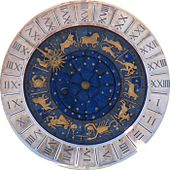
Back Astrologia occidental Catalan Západní astrologie Czech Okcidenta astrologio Esperanto Astrología occidental Spanish Lääne astroloogia Estonian Nkà mmụta kpakpando nke ọdịda anyanwụ IG Astrologia occidentale Italian 西洋占星術 Japanese 서양 점성술 Korean Западна астрологија Macedonian
| Astrology |
|---|
 |
| Background |
| Traditions |
| Branches |
| Astrological signs |
| Symbols |
Western astrology is the system of astrology most popular in Western countries. Western astrology is historically based on Ptolemy's Tetrabiblos (2nd century CE), which in turn was a continuation of Hellenistic and ultimately Babylonian traditions.
Western astrology is largely horoscopic, that is, it is a form of divination based on the construction of a horoscope for an exact moment, such as a person's birth as well as location (since time zones may or may not affect a person's birth chart), in which various cosmic bodies are said to have an influence. Astrology in western popular culture is often reduced to sun sign astrology, which considers only the individual's date of birth (i.e. the "position of the Sun" at that date).
Astrology is a pseudoscience and has consistently failed experimental and theoretical verification.[1][2][3]
Astrology was widely considered a respectable academic and scientific field before the Enlightenment, but modern research has found no consistent empirical basis to it.[4][3]
- ^ Cite error: The named reference
SvenOvewas invoked but never defined (see the help page). - ^ Cite error: The named reference
ASotPwas invoked but never defined (see the help page). - ^ a b Vishveshwara, edited by S.K. Biswas, D.C.V. Mallik, C.V. (1989). Cosmic Perspectives: Essays Dedicated to the Memory of M.K.V. Bappu (1. publ. ed.). Cambridge, England: Cambridge University Press. ISBN 978-0-521-34354-1.
{{cite book}}:|first=has generic name (help)CS1 maint: multiple names: authors list (link) - ^ Kassell, Lauren (May 5, 2010). "Stars, spirits, signs: towards a history of astrology 1100–1800". Studies in History and Philosophy of Science Part C: Studies in History and Philosophy of Biological and Biomedical Sciences. 41 (2): 67–69. doi:10.1016/j.shpsc.2010.04.001. PMID 20513617.
© MMXXIII Rich X Search. We shall prevail. All rights reserved. Rich X Search